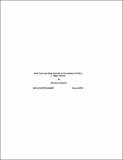| dc.contributor.author | Pindyck, Robert S. | en_US |
| dc.contributor.other | Massachusetts Institute of Technology. Center for Energy and Environmental Policy Research. | en_US |
| dc.date.accessioned | 2009-12-15T23:57:44Z | |
| dc.date.available | 2009-12-15T23:57:44Z | |
| dc.date.issued | 1995 | en_US |
| dc.identifier | 95003 | en_US |
| dc.identifier.uri | http://hdl.handle.net/1721.1/50181 | |
| dc.description.abstract | The standard framework in which economists evaluate environmental policies is cost-benefit analysis, so that policy debates usually focus on expected costs and benefits, or on the choice of discount rate. But this framework can be misleading when there is uncertainty over future outcomes, when there are irreversibilities, and when policy adoption can be delayed. This paper shows how "economic" uncertainty (i.e., uncertainty over future costs and benefits of reduced environmental degradation) and "ecological" uncertainty (i.e., uncertainty over the evolution of an ecosystem) interact with two kinds of irreversibilities-- sunk costs associated with an environmental regulation, and "sunk benefits" of avoided environmental degradation-- to affect optimal policy timing and design. | en_US |
| dc.description.sponsorship | Supported by the National Science Foundation. Supported by the MIT Center for Energy and Environmental Policy Research, the MIT Program on Global Climate Change, and the U.S. Department of Energy. | en_US |
| dc.format.extent | 51 p | en_US |
| dc.publisher | MIT Center for Energy and Environmental Policy Research | en_US |
| dc.relation.ispartofseries | MIT-CEEPR (Series) ; 95-003WP. | en_US |
| dc.title | Sunk costs and sunk benefits in environmental policy : I. basic theory | en_US |
| dc.type | Working Paper | en_US |
| dc.identifier.oclc | 35719366 | en_US |
